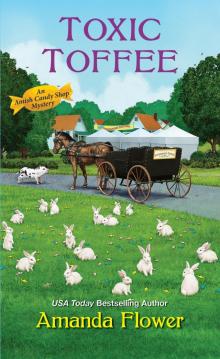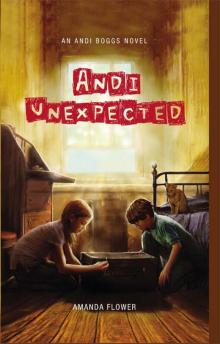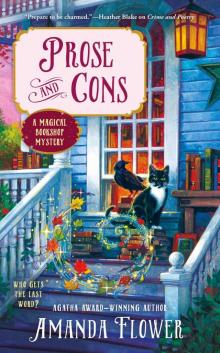- Home
- Amanda Flower
Assaulted Caramel
Assaulted Caramel Read online
PRAISE FOR THE AMISH COZIES OF AMANDA FLOWER
“As it turns out, Amanda Flower may have just written the first Amish rom-com.”
—USA Today
“Flower has hit it out of the ballpark . . . and continues to amaze with her knowledge of the Amish way of life.”
—RT Book Reviews
“At turns playful and engaging as the well-intentioned Englisher strives to rescue her Ohioan Amish friends from a bad fate . . . a satisfyingly complex cozy. Alan is a pseudonym for librarian-author Amanda Flower.”
—Library Journal
“Reading the book is a visit to a town that feels like home.”
—Kings River Life
ASSAULTED CARAMEL
Amanda Flower
KENSINGTON PUBLISHING CORP.
http://www.kensingtonbooks.com
All copyrighted material within is Attributor Protected.
Table of Contents
PRAISE FOR THE AMISH COZIES OF AMANDA FLOWER
Title Page
Copyright Page
Dedication
Acknowledgments
Chapter 1
Chapter 2
Chapter 3
Chapter 4
Chapter 5
Chapter 6
Chapter 7
Chapter 8
Chapter 9
Chapter 10
Chapter 11
Chapter 12
Chapter 13
Chapter 14
Chapter 15
Chapter 16
Chapter 17
Chapter 18
Chapter 19
Chapter 20
Chapter 21
Chapter 22
Chapter 23
Chapter 24
Chapter 25
Chapter 26
Chapter 27
Chapter 28
Chapter 29
Chapter 30
Chapter 31
Chapter 32
Chapter 33
Chapter 34
Chapter 35
Chapter 36
Chapter 37
Chapter 38
Chapter 39
Chapter 40
Chapter 41
Epilogue
Swissmen Sweets Salted Caramel Fudge
Teaser chapter
KENSINGTON BOOKS are published by
Kensington Publishing Corp.
119 West 40th Street
New York, NY 10018
Copyright © 2017 by Amanda Flower
All rights reserved. No part of this book may be reproduced in any form or by any means without the prior written consent of the Publisher, excepting brief quotes used in reviews.
If you purchased this book without a cover, you should be aware that this book is stolen property. It was reported as “unsold and destroyed” to the Publisher and neither the Author nor the Publisher has received any payment for this “stripped book.”
Kensington and the K logo Reg. U.S. Pat & TM Off.
ISBN: 978-1-4967-0639-3
First Kensington Mass Market Edition: September 2017
eISBN-13: 978-1-4967-0640-9
eISBN-10: 1-4967-0640-4
First Kensington Electronic Edition: September 2017
For the staff at the
Hudson Library & Historical Society
Acknowledgments
Writing is solitary craft, but it takes a team of dedicated dreamers to publish a novel. I’m lucky to have one of the best in the business.
Special thanks, as always, to my super agent, Nicole Resciniti. She is more than an agent. She is my friend, dream maker, and spirit guide in writing and in life. Thank you is never enough. Special thanks, too, to AJ Trauth. I never would have written this series if not for his persistence and enthusiasm for the story.
Thanks to the wonderful team at Kensington Books, starting with Peter Senftleben, who acquired my Amish Candy Shop Series when it was a mere idea, and Alicia Condon, who steered it in the right direction with her thoughtful comments and encouragement.
Thanks, too, to my wonderful assistant, Molly Carroll, who read the novel when it was raw and unwieldy, and to my dear friend Suzy Schroeder for her advice on recipes and all things candy making.
To my dearest friend, Mariellyn Grace, love and thanks for listening to hours and hours of plot twists and turns during the drafting of this book. And love to my family—Andy, Nicole, Isabella, and Andrew—for their unwavering support.
Finally, to my Heavenly Father. The path you put me on is truly amazing, and I am grateful for every story I’m given the opportunity to tell.
Chapter 1
“I still can’t believe you left!” Cassandra Calbera shouted into my ear. “They’re making the announcement Monday. You have to be here!”
I held the phone away from my face and imagined my best friend standing in the middle of Jean Pierre’s test kitchen in the back of JP Chocolates in Midtown, New York. She’d be in her chef whites and have her short, purple and black hair pinned behind her ears to keep it out of her eyes. I prayed that she was alone, considering the direction of our conversation. The fewer people who knew I’d left the city, the better.
While Cass continued to tell me all the reasons why I should immediately return to New York, I parked in the first spot I could find on Apple Street, which ran perpendicular to Main Street. Apple trees lined either side of the narrow lane. In the spring, they looked like flowering white torches marching up the road, forming a beautiful canopy. When I was a little girl, I had asked my grandfather why the apple trees never had any apples. He replied that the English residents of the village didn’t like the apples because they made a mess on the street and sidewalk, so the Englishers made the trees sterile. At the age of five, I had no idea what sterile meant, but it sounded bad. “It is the Englisch way,” he had said. “To change what Gott created into something more convenient.”
This late in September, the tree’s leaves had turned yellow-gold, and a few fell to the sidewalk in the breeze that rolled over the green hills surrounding the village.
“Bai, are you listening to me?” Cass demanded.
I took a deep breath. “I explained to Jean Pierre before I left. This is a family emergency. My grandfather is sick. Jean Pierre understood. Besides, it’s only Thursday. I’ll be home in time for the announcement on Monday morning.”
“Jean Pierre might understand, but the selection committee will not. They’re looking for any excuse to give that skunk Caden the head chocolatier job. Just because he’s French, and they think it goes better with the brand of Jean Pierre’s empire. Do you think I should run the mob just because I’m Italian?”
“You probably wouldn’t be bad at it.”
“First of all, that comment is both flattering and insulting. Second, you are completely missing my point.”
“What would that be?” I asked, rubbing my forehead and staring out the windshield of the rental car I had picked up at the tiny Akron-Canton Airport. There hadn’t been much selection, and the inside of the car smelled faintly of stale cigarettes. The smell was giving me a headache. As I stared out the window, an Amish buggy clopped down the cross street. Inside, an Amish man with a long dark beard chatted with the Amish boy in the passenger seat. The boy was laughing. I couldn’t be farther from Midtown if I tried.
“Are you listening to me?” Cass asked.
I blinked. I hadn’t realized she was still talking. As much as I loved my best friend, she had a tendency to ramble when she was really passionate about a subject. “I’m listening,” I lied.
“You not being here the week before their final decision as to who will be Jean Pierre’s replacement only makes it easier for them to give it to that jerk. Is that what you want?”
> “Jean Pierre won’t let them do that.” I had been Jean Pierre’s first chocolatier and protégé for so long, that everyone, even me, assumed that I would be appointed as head chocolatier at JP Chocolates when Jean Pierre retired.
“It’s not Jean Pierre’s decision,” she argued. “When the chocolate company went public, all the power went to the board of directors, which is the selection committee. Sure, they may listen to Jean Pierre’s suggestions, but they can do whatever they want.”
She wasn’t telling me anything I didn’t already know. I rubbed my temples. I had to get out of the car. “Cass, I’m not going over this again with you. My grandfather is ill. He’s more important than some job.”
“It’s not just some job, Bailey. You’ve been working for this for six years. Six years. Do you want to throw away all the thousands of hours you spent on perfecting your craft?”
I drummed my fingers on the steering wheel. “Of course not.”
“Then, come back—”
“Oh, Cass, can you hear me? You’re breaking up,” I said. “I’m way out in the country now . . .”
“Bailey? Bailey, can you hear me? Bai?”
I hung up the phone. As a native New Yorker, Cass questioned cell phone reception anywhere west of Manhattan.
I scrolled through my text messages for a response from Eric Sharp. Nothing. The last text messages had been from me to him, telling him I was heading to Ohio to visit my ailing grandfather, telling him I was at the airport, and telling him I had landed in Akron. No response to any of them. I reminded myself that between his two pastry shops, television show, and thousands of other obligations, Eric didn’t have time to text his girlfriend, especially since he and I were the only ones who knew we were dating. I threw the phone into my purse. Despite Eric’s impossible schedule, a short “thinking of you” text would have lifted my spirits considerably, because I was pretty certain Cass was right. My rash decision to drop everything and fly to Ohio did put my promotion to head chocolatier at JP Chocolates at risk. I shook my head. I’d had no other choice. When my grandmother had called to tell me my grandfather was ill, I had to go. My grandmother only called if it was an emergency. The Amish didn’t use the telephone for chitchat.
Through the windshield of my rental car, I watched as a second horse-and-buggy rolled by. I had told Cass that I was in the country; I hadn’t told her I was in Amish Country. The village of Harvest in Holmes County, Ohio to be specific. I wasn’t sure what my fashionable coworker would have said if she knew I had Amish relatives. She’d probably wonder if I had a bonnet hidden somewhere in my apartment.
My grandparents might be Amish, but I wasn’t. Neither were my parents. My father had grown up Amish and then left his district to marry my mother. Right now, Mom and Dad were having the very un-Amish adventure of traveling through Europe to celebrate their thirtieth wedding anniversary. Judging by the number of vacation photos in my email inbox, I could safely say that Mom and Dad had mastered the selfie and were on a personal mission to snap a photo of themselves with every major landmark in Europe. The last one I had received included the Leaning Tower of Pisa.
I took a deep breath and stepped out of the car. I would have to buy an air freshener if I was going to spend any significant amount of time in the rental car, or risk asphyxiation. As I walked to the corner of Apple and Main Street, I hoped that Daadi and Maami would be happy to see me. My grandparents didn’t know I was in town. My grandmother had called to tell me Daadi was ill, but she’d asked me not come. She said Daadi would not wish me to leave my work on his account.
I turned the corner onto Main Street, passing an Amish woman pushing a double stroller. Two plainly dressed toddlers sat in the stroller, kicking each other with their small feet. The mother said something to them in Pennsylvania Dutch. The children giggled, and I felt myself relax. I had made the right decision. The selection committee members wouldn’t change their minds about choosing me as the head chocolatier just because I took a couple of vacation days that were owed me. I hadn’t taken a single day off from work since last year, when Jean Pierre had announced his planned retirement.
Main Street was the primary shopping district in the tiny village of Harvest, Ohio. Gas-powered lamps marched down the street, alternating with more apple trees, and store fronts advertised Amish-made products—everything from quilts to baskets to pretzels and brooms. Returning here felt like stepping back in time. Not into a former century, as many people misperceived the Amish culture, but into a bustling community of shops and merchants, where clothes and home goods and foods were locally harvested and handmade. Cass would be horrified—there wasn’t a Starbucks or a department store in sight. Me, I rather liked the simplicity and authenticity. I specialized in chocolates, so it made me smile to think that people specialized in furniture and cheeses and even blank-faced Amish dolls.
My grandparents’ store—Swissmen Sweets—was in the most coveted spot on the street. It was right across from the town square, where the village held the Apple Blossom Festival in the spring, community picnics in the summer, farmers’ markets in the autumn, and ice-skating in the winter. Everyone in town wanted Daadi’s location, but he had owned it for well over fifty years, and he was way too smart to sell.
I was about a block from Swissmen Sweets when I spotted my grandfather leaning on a walker in front of his candy shop. His snow-white Amish beard hung to his chest, and his black felt hat sat primly on the top of his head. He spoke to a non-Amish man wearing a business suit that could have been sold in any number of the New York department stores Cass loved to frequent.
I took a deep breath, happy to see Daadi was no longer in the hospital as he had been when my grandmother called, but the walker frightened me. Daadi was a proud man, and he must hate having to rely on the contraption to keep him from toppling over.
I started to wave to attract my grandfather’s attention, but stopped myself when I was close enough to overhear their conversation.
Daadi gripped the sides of his walker until his knuckles turned white. “I have told you before, we’re not interested.”
The man in the suit appeared to be in his late forties. He wore his brown hair combed back in a wave and his tan had the slightest hint of orange. “You’re a fool. No one is going to make you a better offer than I am.”
“That is gut,” Daadi said. “Because I do not want any more offers. I’m happy with what I have. More importantly, Gott is happy with it. Now, if I cannot interest you in any fudge, I must ask you to leave.”
The man pointed at my grandfather. “You’re just prolonging the inevitable. When you’re gone, this property will belong to me. There’ll be no one to stand in my way. You don’t have any family to take it over.”
My chest constricted. Daadi did have family. He had Maami, and he had me. I clenched my teeth and started walking toward the pair at a fast clip.
The man spun around and headed directly for me. Not watching where he was going, he ran smack into my shoulder. “Hey!” I shouted at him, so loudly I wouldn’t have been surprised if they heard me back in New York.
He blinked at me. In Harvest, pedestrians didn’t yell at each other like they did in the city. I could use this to my advantage. “Watch where you’re going.”
He straightened his jacket. “Get out of my way.”
I was going to say something else, but then I saw Daadi over the man’s shoulder. Daadi was bent over his walker. He held his chest and crumpled to the sidewalk.
I ran to him. “Daadi!” I held him in my arms and looked back up the sidewalk. The man glanced at me, shock registering on his face, before he turned the corner onto a side street and disappeared.
“Bailey.” Daadi touched my cheek. “What are you doing here?”
Before I could answer, he lost consciousness.
Chapter 2
My grandparents’ family doctor was an English man in his late fifties with a wide, kind face that immediately put me at ease. He put his blood pressure cuff in
his medical bag and adjusted his wire-rimmed glasses on the long bridge of his nose. “Jebidiah, I do think you should go to the hospital for some additional tests.”
Daadi shifted his position on the nest of pillows my grandmother had made for him on their bed in the small apartment above the fudge shop. “Nee, I have been to the hospital too many times. They always tell me the same. My heart is weak. I don’t have much more time. I do not need to hear this again. When Gott calls me home, I will be ready. Going to the hospital won’t change that.”
It felt like someone reached into my chest and squeezed my own heart in a vise when my grandfather stated this so matter-of-factly. I agreed with the doctor. Daadi should go to the hospital. After he had collapsed on the sidewalk, I started to call 911 when my grandmother asked me to stop. She said Daadi didn’t want the ambulance called. Instead, she called their family doctor, Dr. Brown, who had an office on the other side of the square and was there in a matter a minutes. During that time, Daadi had come to, and Dr. Brown and I half led, half carried Daadi up the stairs to his room.
The doctor sighed. “I expected you to say that.” He glanced at my grandmother, who stood on the opposite side of the bed, holding Daadi’s hand. “Clara, please call me day or night if you need me. I’ll be here as quick as I can.”
My tiny grandmother nodded. “Danki, Dr. Brown.” The white prayer cap on her head blended in with her soft, silver hair. Her hair had once been brunette like mine, but it had been silver for as long as I had known her.
The doctor nodded and headed for the door.
Before he reached the bottom of the back stairs, I rushed out of the room. “Doctor, what’s wrong with my grandfather?”
Dr. Brown looked up at me from the middle of the narrow staircase. The gas-lit wall sconce illuminated his broad face. There was a sadness in his eyes that I hadn’t noticed when he had been in the bedroom with my grandparents. “Congenital heart disease.”

 Marshmallow Malice
Marshmallow Malice Verse and Vengeance
Verse and Vengeance Mums and Mayhem
Mums and Mayhem Toxic Toffee
Toxic Toffee Criminally Cocoa
Criminally Cocoa Assaulted Caramel
Assaulted Caramel Maid of Murder aihm-1
Maid of Murder aihm-1 Murders and Metaphors
Murders and Metaphors Matchmaking Can Be Murder
Matchmaking Can Be Murder Maid of Murder (An India Hayes Mystery)
Maid of Murder (An India Hayes Mystery) Andi Under Pressure
Andi Under Pressure Appleseed Creek Trilogy, Books 1-3
Appleseed Creek Trilogy, Books 1-3 A Plain Disappearance
A Plain Disappearance Andi Unstoppable
Andi Unstoppable The Final Vow
The Final Vow A Plain Malice: An Appleseed Creek Mystery (Appleseed Creek Mystery Series Book 4)
A Plain Malice: An Appleseed Creek Mystery (Appleseed Creek Mystery Series Book 4) The Final Tap
The Final Tap The Final Reveille: A Living History Museum Mystery
The Final Reveille: A Living History Museum Mystery Andi Unexpected
Andi Unexpected Lethal Licorice
Lethal Licorice Premeditated Peppermint
Premeditated Peppermint Death and Daisies
Death and Daisies Prose and Cons
Prose and Cons